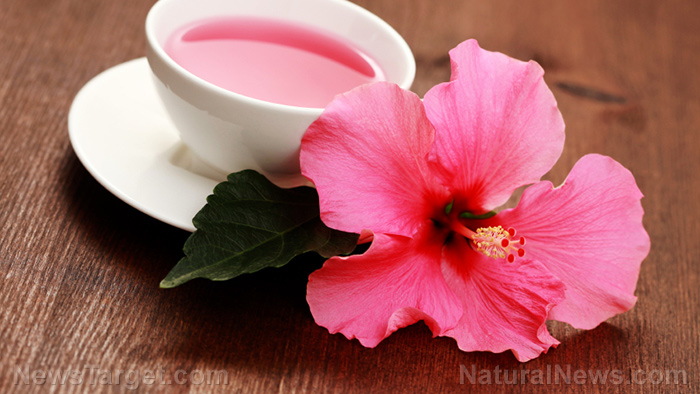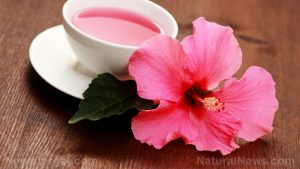
Hibiscus – sources, health benefits, nutrients, uses and constituents at NaturalPedia.com
Thursday, July 20, 2017 by Jhoanna Robinson
http://www.naturalpedia.com/hibiscus-sources-health-benefits-nutrients-uses-and-constituents-at-naturalpedia-com.html

Hibiscus plants, which have the scientific name Hibiscus sabdariffa, are popular for their attractive and colorful blooms. They come in different vibrant colors such as red, orange, peach, yellow, or white and grow up to six inches wide. Hibiscus plants have many monikers in different parts of the world, namely, Roselia in Australia, flor de Jamaica in select areas of Latin America, and sorrel in Jamaica. Their most common types include tropical hibiscus, hardy perennial hibiscus, and hardy shrub hibiscus.
Hibiscus plants are mostly used for ornamentation, but they are also abundant in medicinal purposes.
Hibiscus tea, which is also known as sour tea because of its acidic and sharp taste, comprises a mixture of dried hibiscus flowers, leaves, and dark red calyces, or the cup-shaped centers of the flowers which hold the plant’s seeds and which are the main ingredients in hibiscus teas.
During ancient times, the Egyptians prepared concoctions of hibiscus tea to lower body temperature, address heart and nerve issues, and induce urination. Ancient Africans, on the other hand, used hibiscus tea to treat constipation and colds, and to address issues and ailments that came from having a diseased liver.

List of known nutrients
- Calcium
- Chlorogenic Acid
- Cryptochlorogenic Acid
- Glycoside
- Gossypetin
- Hibiscetine
- Iron
- Kaempferol
- Magnesium
- Neochlorogenic Acid
- Phosphorus
- Potassium
- Quercetin
- Sabdaretine
- Vitamin C
Medicinal uses for hibiscus
Hibiscus can lower blood pressure and cholesterol levels. It can reduce one’s chances of incurring hypertension. It does so by positively impacting the activities of a blood vessel dilator called nitric oxide. Also, the magnesium in hibiscus ensures heart health by promoting proper blood circulation.
Hibiscus is said to have a positive impact on metabolism; it can prevent obesity and fat accumulation in the liver. It has laxative effects and anti-diabetic properties. It can also be taken to deal with an upset stomach and constipation.
An herbal extract mixture of hibiscus is good for getting rid of head lice. For best results, grind hibiscus flowers into powder form, mix it with some water, and apply to the affected part of the scalp. Aside from treating head lice, the application of hibiscus on the scalp can also address hair loss problems that are caused by thyroid disorders. Hibiscus also prevents premature graying of the hair by ensuring that enough nutrients reach the hair follicles.
Hibiscus can fight cancer-causing elements. It has the ability to do this due to the presence of antioxidants such as chlorogenic acid, cryptochlorogenic acid, neochlorogenic acid, glycosides, kaempferol, and quercetin, which get rid of harmful free radicals that seek to cause damage to cells and the DNA. Free radicals negatively impact cells in the sense that cells are led to believe that they are not yet done with their life-cycle, and so they replicate more cells than what is healthy for the body, resulting in cancerous formations.
The antioxidants in hibiscus are also responsible for hibiscus’ anti-aging properties, which help in making people, especially women, look five times younger than their actual age. Aside from this, hibiscus prevents women from experiencing hot flashes during their menopausal years.
Body systems supported by hibiscus
Hibiscus has antibacterial and anti-inflammatory properties. It is also good for increasing the body’s immunity against colds, fever, and flu.
Hibiscus has diuretic properties. It encourages urine production, which in turn causes the elimination of toxins in the body and regulation of blood pressure levels.
The calcium in hibiscus is good for strong bones and healthy teeth.
The iron in hibiscus provides stamina and energy by making sure that enough oxygen is transported into the muscles.
Ways to use hibiscus
For scrumptious and mouth-watering dishes that are garnished or peppered with gardenia, visit this site.
Where to learn more
- Seeking a low-cost solution to cardiovascular troubles? Hibiscus may be the answer
- Hibiscus tea is excellent to maintain healthy cholesterol and blood pressure levels
- Lower your blood pressure with hibiscus tea
- Make Your Own Multivitamin: Tea Recipe
- Hibiscus Tea Significantly Lowers Blood Pressure
Summary
Hibiscus can fight cancer-causing elements.
Hibiscus has antibacterial, anti-inflammatory, and diuretic properties.
The calcium in hibiscus is good for strong bones and healthy teeth.
The iron in hibiscus provides stamina and energy by making sure that enough oxygen is transported into the muscles.
Sources include:
Tagged Under: Tags: hibiscus





